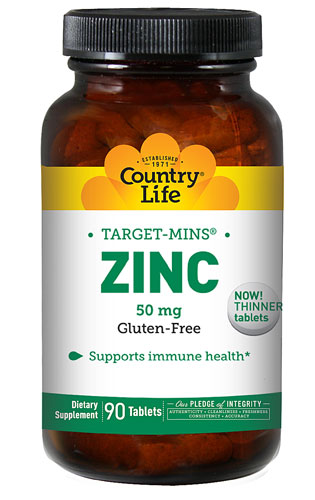Zinc is an essential mineral, responsible for many critical functions in the human body. However, the body cannot naturally produce or store the nutrient, which means that it must be obtained through food and/or supplements. Read on to learn about the many benefits of zinc and check out five of our favorite zinc lozenges!
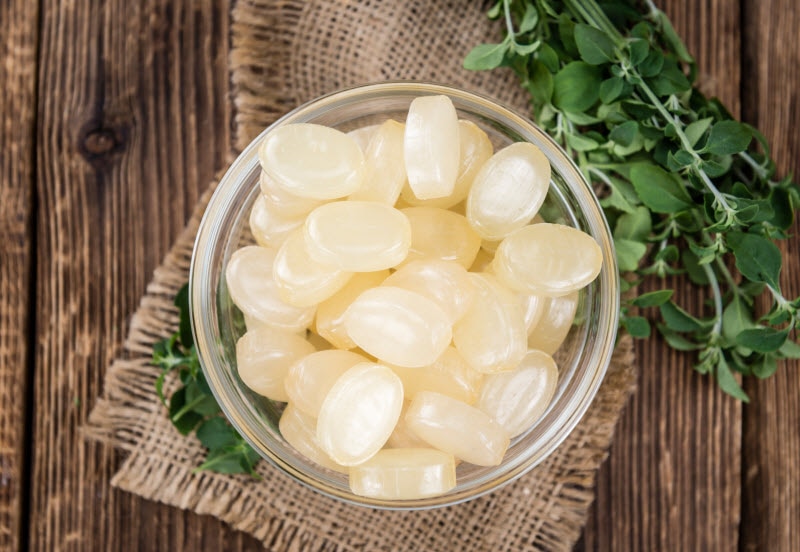
What does zinc do?
According to the
National Institutes of Health (NIH) Office of Dietary Supplements, zinc is involved in many aspects of cellular metabolism. In addition to being “required for the catalytic activity of approximately 100 enzymes,” NIH maintains that zinc plays a role in the following:
- Immune function
- Protein synthesis
- Wound healing
- DNA synthesis
- Cell division
The mineral, which must be present in the body to ensure proper smell and taste, “also supports normal growth and development during pregnancy, childhood and adolescence.”
How much zinc do we need?
Recommended Dietary Allowances (RDAs) of zinc vary by age. For example, infants up to six months of age require 2 mg of zinc daily, regardless of gender, according to NIH. It is recommended that women aged 19 and older have 8 mg of zinc daily, and the RDA for men aged 19 and older is 11 mg per day. Women who are pregnant require 11 mg of zinc daily and those who are lactating should aim for 12 mg.
Vegans, vegetarians and individuals with certain conditions, such as anorexia, bulimia, chronic kidney disease and Crohn’s disease, may be at increased risk of zinc deficiency. Such a deficiency may be treated with high-dose supplements.*
Dietary sources of zinc
Zinc can be found in many different foods. Shellfish—particularly oysters—are a wonderful source of the nutrient. Other
foods that are rich in zinc include:
- Meat (e.g., beef, bison, pork and lamb)
- Poultry (e.g., chicken and turkey)
- Fish (e.g., flounder, salmon, sardines and sole)
- Legumes (e.g., black beans, chickpeas, kidney beans and lentils)
- Nuts and seeds (e.g., cashews and pumpkin seeds)
- Dairy products: (e.g., cheese, milk and yogurt)
- Eggs
- Whole grains (e.g., brown rice, oats and quinoa)
- Some vegetables (e.g., asparagus, kale, mushrooms and peas)
5 best zinc lozenges to consider
Concerned that you may not be getting enough zinc from your diet? Dietary supplements are a great way to help ensure your body is getting all the nutrients it needs, including zinc.* Following are five of our top product picks:
Life Extension Natural Citrus Orange Zinc Lozenges. These citrus-flavored vegetarian lozenges provide “nutritional support for the body’s natural defense system.” Chew one—or allow it dissolve in your mouth—daily for best results!
†
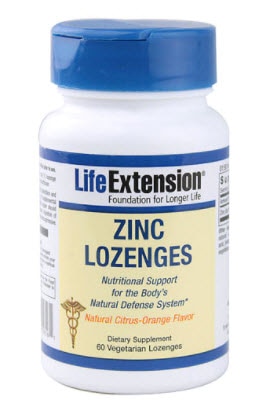 Nature's Way Original Sambucus Elderberry Zinc Lozenges.
Nature's Way Original Sambucus Elderberry Zinc Lozenges. In addition to being an excellent source of both zinc and vitamin C, these organic, gluten-free lozenges contain “full-spectrum black elderberry extract that is from a unique blend of black elderberries that are naturally richer in Flavonoid BioActives®,” which help protect the body from everyday stressors and toxins. Plus, they taste great, too!
†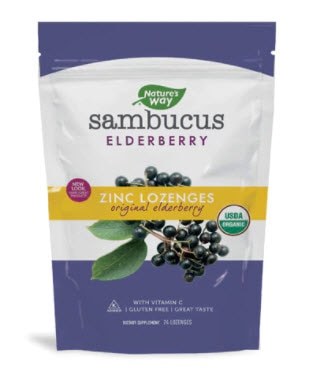 Zand Sweet Elderberry Zinc HerbaLozenge®.
Zand Sweet Elderberry Zinc HerbaLozenge®. Free of cane sugar, corn syrup and sucrose, these “Good-for-You Lozenges™” contain pure brown rice syrup and a “soothing blend of herbal extracts.” In addition to providing “nutritive support for healthy immune function,” they help provide natural relief for sore throats.
†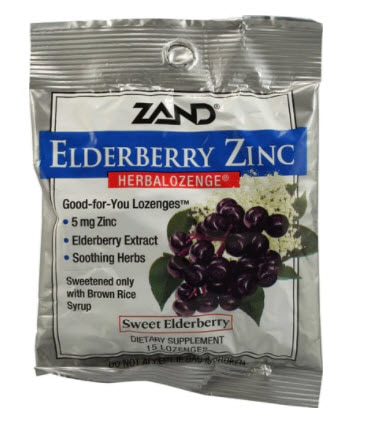 Quantum Elderberry Raspberry TheraZinc® Lozenges.
Quantum Elderberry Raspberry TheraZinc® Lozenges. Bolster your immunity with these gluten-free lozenges, which contain zinc and elderberry, “two immune health powerhouse ingredients.” Delicious natural raspberry flavor!
†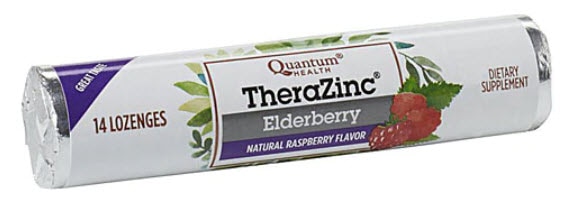 KALKal Cherry LoZINCges™.
KALKal Cherry LoZINCges™. These cherry-flavored lozenges “are intended to provide nutritive support for general well-being during the fall and winter months.” In addition to zinc, they contain soothing Slippery Elm & Bee Propolis, and can be taken up to 12 times daily.
†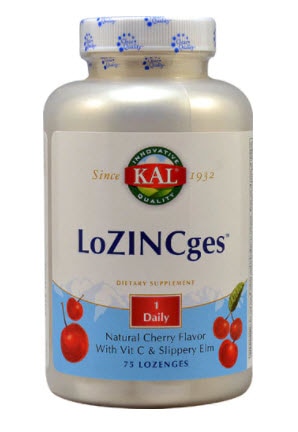 *Always consult a physician prior to taking a new dietary supplement.
†These statements have not been approved by the Food and Drug Administration. These products are not intended to diagnose, treat, cure or prevent disease.
*Always consult a physician prior to taking a new dietary supplement.
†These statements have not been approved by the Food and Drug Administration. These products are not intended to diagnose, treat, cure or prevent disease.
 Nature's Way Original Sambucus Elderberry Zinc Lozenges. In addition to being an excellent source of both zinc and vitamin C, these organic, gluten-free lozenges contain “full-spectrum black elderberry extract that is from a unique blend of black elderberries that are naturally richer in Flavonoid BioActives®,” which help protect the body from everyday stressors and toxins. Plus, they taste great, too!†
Nature's Way Original Sambucus Elderberry Zinc Lozenges. In addition to being an excellent source of both zinc and vitamin C, these organic, gluten-free lozenges contain “full-spectrum black elderberry extract that is from a unique blend of black elderberries that are naturally richer in Flavonoid BioActives®,” which help protect the body from everyday stressors and toxins. Plus, they taste great, too!† Zand Sweet Elderberry Zinc HerbaLozenge®. Free of cane sugar, corn syrup and sucrose, these “Good-for-You Lozenges™” contain pure brown rice syrup and a “soothing blend of herbal extracts.” In addition to providing “nutritive support for healthy immune function,” they help provide natural relief for sore throats.†
Zand Sweet Elderberry Zinc HerbaLozenge®. Free of cane sugar, corn syrup and sucrose, these “Good-for-You Lozenges™” contain pure brown rice syrup and a “soothing blend of herbal extracts.” In addition to providing “nutritive support for healthy immune function,” they help provide natural relief for sore throats.† Quantum Elderberry Raspberry TheraZinc® Lozenges. Bolster your immunity with these gluten-free lozenges, which contain zinc and elderberry, “two immune health powerhouse ingredients.” Delicious natural raspberry flavor!†
Quantum Elderberry Raspberry TheraZinc® Lozenges. Bolster your immunity with these gluten-free lozenges, which contain zinc and elderberry, “two immune health powerhouse ingredients.” Delicious natural raspberry flavor!† KALKal Cherry LoZINCges™. These cherry-flavored lozenges “are intended to provide nutritive support for general well-being during the fall and winter months.” In addition to zinc, they contain soothing Slippery Elm & Bee Propolis, and can be taken up to 12 times daily.†
KALKal Cherry LoZINCges™. These cherry-flavored lozenges “are intended to provide nutritive support for general well-being during the fall and winter months.” In addition to zinc, they contain soothing Slippery Elm & Bee Propolis, and can be taken up to 12 times daily.† *Always consult a physician prior to taking a new dietary supplement.
†These statements have not been approved by the Food and Drug Administration. These products are not intended to diagnose, treat, cure or prevent disease.
*Always consult a physician prior to taking a new dietary supplement.
†These statements have not been approved by the Food and Drug Administration. These products are not intended to diagnose, treat, cure or prevent disease.



